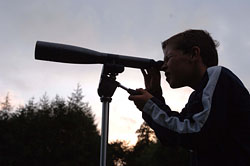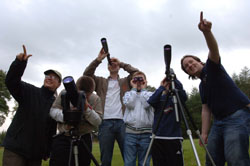Our night skies have all but disappeared from view in many large towns and cities. Many people in Britain can no longer see the stars at night due to light pollution, in fact our own galaxy the Milky Way is often obscured from view. This year is the International Year of Astronomy, commemorating the 400th anniversary of Gallileo’s night sky exploration using a telescope. We decided to look at the issues and find out what can be done to prevent light pollution at night.
Wildlife Affected
Boy scouts have dropped the outdoor observation element of the Stargazer Badge, as it is increasingly difficult to locate the stars in the sky. Many of us, especially those living in cities and large towns can see only five of the twelve zodiac constellations. Wildlife are affected too, bat and bird populations are suffering because the hours of darkness they need for successful feeding have been reduced. From an environmental viewpoint we consume vast amounts of energy and create tonnes of CO2 by using excessive artificial lighting.
Glowing Sky
Concerned astronomer, Bob Mizon helped to launch the UK wide Campaign for Night Skies, around 20 years ago. In 2006 they asked people to count how many stars they could see within the constellation of Orion. Over half of the 2000 respondees could see only 10 stars or less. In a truly dark sky around 50 stars would be visible to the naked eye within this constellation. The results indicate severe light pollution, even in rural areas, as ‘sky glow’ can spread deep into the countryside from towns and cities. The alluring phrase ‘sky glow’ is used to describe a brightening of the night sky caused by artificial light.
Artificial Lighting
Sky glow is caused by poorly fitted lights, such as streetlights, security, floodlights, advertising and display lighting and building illumination, positioned to allow light to shine upwards. As Bob says, “We are not anti-lighting, just anti bad-lighting. We are campaigning against excessive, inefficient and irresponsible lighting that shines where it’s not wanted or needed.†UK streetlights alone waste £100 million a year and result in 1 million tonnes of CO2 pumped into the atmosphere annually.
Security lighting imported from factories in the Far East is springing up on private properties all over the Western world as we become more worried about protecting our belongings. At 500 watts, they are three times brighter than the Institute of Lighting Engineers recommends. All this extra light makes Britain the third most light polluted country in Europe.
Natural World
Light pollution can also be disruptive to feeding and breeding cycles of our native wildlife. In heavily lit areas birds can often be heard continuously chirping throughout the night. The feeding area for owls and other night hunting birds is also severely reduced. Artificial light can throw migrating birds off course resulting in death for those that mistake illuminated buildings for the moon or stars.
Light attracts insects and bad lighting either kills them instantly due to the heat of the bulb or exhausts them with the effort of flying round and round until too tired to eat or procreate. Meanwhile gloworms and fireflies find it difficult to find mates as their own bioluminescence is dimmed.
“Darkness is becoming an increasingly scarce commodity, much like silence.”
Human Response
Reports suggest that light pollution could have a serious impact on our health and wellbeing. Dr. Chris Idzikowski of the Sleep Assessment and Advisory Service explains, “Artificial Lighting could lead to a disruption of sleeping patterns, hyperactivity and may have a negative impact on a child’s health.†Nocturnal light disrupts the body’s hormone production, most notably melatonin, which controls oestrogen production. The result of this could be more oestrogen related problems such as breast cancer.
Our circadian rhythms are being disrupted. These rhythms define ebb and flow; our life’s processes, from sleep to digestion, hormones to immune system. When these are messed up it can have a disconcerting effect. Michael Crichton, author of Jurassic Park muses, “Modern city dwellers cannot even see the stars at night, This humbling reminder of man’s place in the scheme of things, which human beings once saw every 24 hours is denied them. It’s no wonder people lose their bearings, that they lose track of who they really are and what their lives are really about.†As the distinction between day and night becomes blurred, darkness becomes an increasingly scarce commodity, much like silence.

Dimming the switch
Thankfully we are starting to wake up to the effects caused by artificial light. In Rome for example street lighting is dimmed after midnight. And in the UK, energy costs were halved when dimming technology was installed on the M65. The bonus side effect being a marked reduction in visual stress to night drivers. As Bob Mizon concludes, “Solutions include minimising power of lights, using efficient lighting and directing light just where it is needed.†So if we want to be able to point out the stars to our grandchildren, we’d do well to reduce our reliance on lighting at night and start to respect the dark skies as our ancestors did.
Resources:
Campaign for Dark Skies
International Dark Sky Organisation
Campaign to Protect Rural England
Dark Sky Scotland – programme of astronomy events
Light facts
A total of 19% of all electricity is used on lighting and about a third of that is misdirected into the sky.
Golf driving ranges, ferry terminals, sports stadia, prison and road junctions are the worst light polluters in this country
Inefficient street lighting wasted more than £100m worth of energy last year according to the Campaign for Dark Skies.
Light pollution has increased by 24% in the past seven years.







